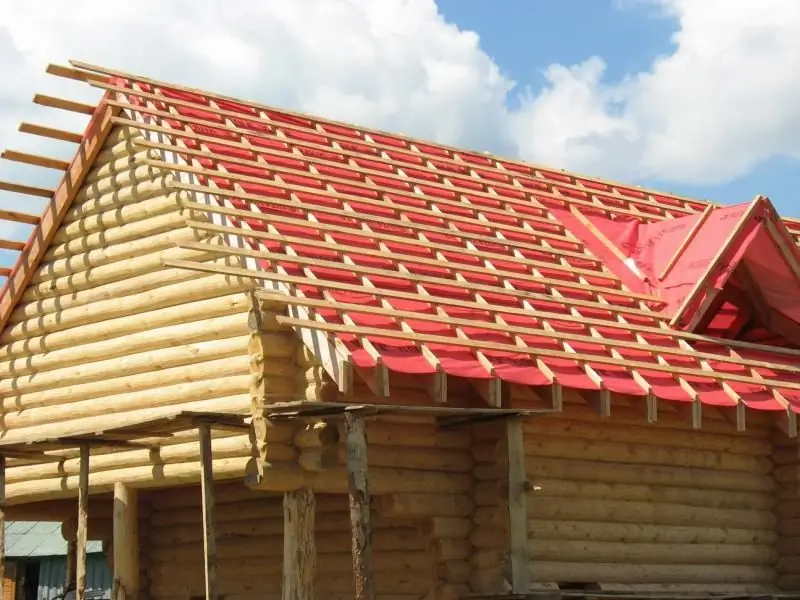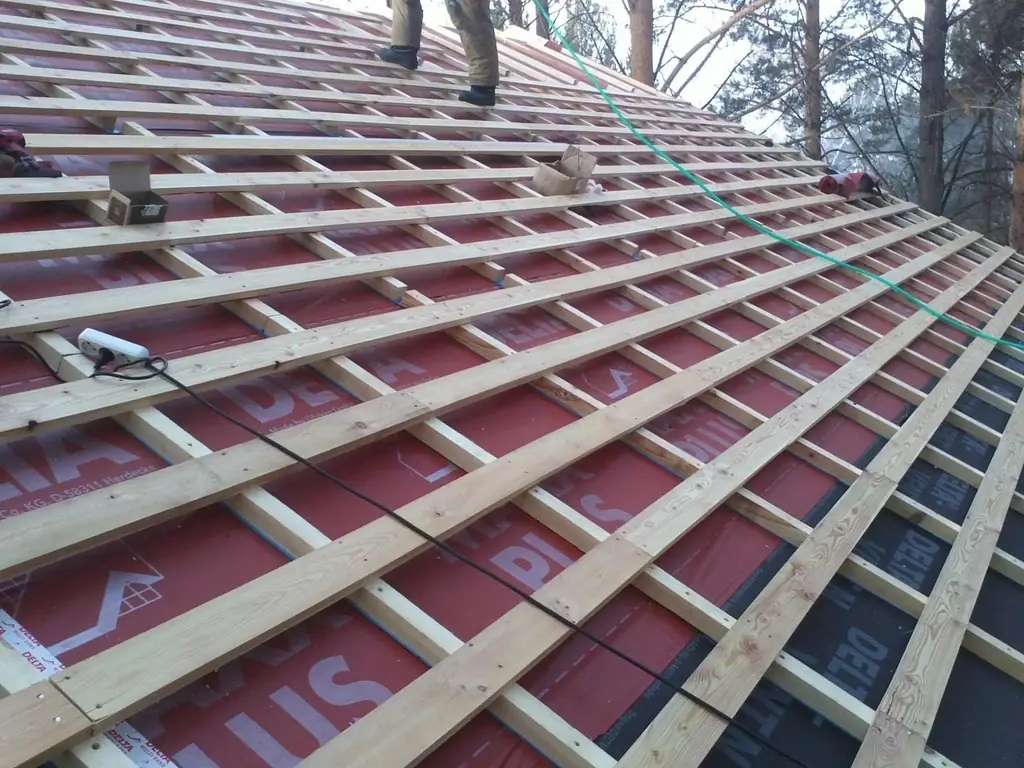
Table of contents:
- Author Bailey Albertson [email protected].
- Public 2024-01-17 22:26.
- Last modified 2025-06-01 07:32.
Why do you need a counter lattice for metal tiles and how to make it

Metal roofing is a crucial stage that completes the main work on the construction of a house. It is important to perform it as accurately as possible and in accordance with the recommendations of specialists. The correct installation of the counter-lattice is of particular importance, since it determines the conditions for the long-term operation of the structure.
Content
-
1 Purpose of the counter grill
- 1.1 Why do you need a membrane
- 1.2 What is metal roofing
- 1.3 Photo gallery: how to install the counter batten
-
1.4 How necessary is a counter-lattice for metal tiles
- 1.4.1 Photo Gallery: Providing ventilation using a counter grill
- 1.4.2 Video: is it necessary to do a counter-grill - personal conclusions on your roof
-
2 Installation of a counter-lattice for metal tiles
2.1 Video: installation of waterproofing, counter battens and battens
- 3 Additional recommendations for the construction of a counter-lattice for metal tiles
Purpose of the counter grill
The installation of the roofing system is carried out in layers, each of which has its own purpose. In this way, a device called a roofing pie is formed. Its purpose is to perform several specific functions:
- Protecting your home from external influences such as rain, snow, hail and wind.
- Insulation of the building to prevent heat loss. It is believed that with a cold roof, losses can be 25-30%. And since we are talking about a durable object, the costs incurred for roof insulation quickly pay off in the presence of a warm roof.
- Maintaining the temperature and humidity conditions in the house through the use of one-sided membrane materials.
-
Isolation of the truss system from moisture penetration into it from the outer space. It is the most dangerous factor for timber structures.

Roofing cake The roofing cake consists of several layers, the device of each of which is mandatory when building a warm roof.
The ventilation duct in the roofing cake is designed to remove moisture that forms on the inner surface of the metal tile. For this, a counter-lattice is installed on the side ends of the rafter legs. But first, a membrane is pulled over them, which has the ability to pass moisture in one direction. This is facilitated by microscopic holes along the entire surface of the film, which must be installed without tension so that these holes do not deform. Separate strips along the length are laid with an overlap of 7-10 centimeters, and the joints are glued with tape. Initially, the film can be fixed with a stapler, and at the end of its laying, bars 25x50 or 40x50 millimeters in size, which are called counter-lattice, are packed on the edges of the rafter legs.
Why do you need a membrane
Membrane films have long been used in large quantities abroad. However, many domestic developers do not appreciate this material and, trying to save on building materials, use ordinary solid polyethylene. Perhaps there is a lack of information, which indicates a low culture of design and installation.
By and large, a membrane is any layer between several volumes of confined space. But in our case, we are dealing with selective passage partitions, selectively allowing moisture in the form of vapors to pass through. The practice has developed to call such partitions membranes, and a continuous film of polyethylene vapor barrier or waterproofing.

Membrane film allows moisture to pass in only one direction
If a metal tile is chosen as the finishing coating of the roof, it is advisable to use a bar of 50x50 millimeters for the counter-lattice. This is due to the fact that this sheet is vertically profiled, and therefore, the space under it has a variable section.
What is metal roofing
Metal roofing tiles are formed from galvanized steel, aluminum or copper sheets. A profile that imitates a natural ceramic coating is made by stamping on special equipment. Various color solutions are obtained by applying reliable protective paint and varnish or plastic coatings.

A sheet of metal tile is galvanized on both sides, and then processed with decorative protective coatings
The basis for the manufacture of inexpensive metal tiles is a galvanized steel sheet with a thickness of 0.4-0.5 mm. Its strength characteristics are determined by the complex shape of the profile, and its durability is determined by the quality of the protective coating. The warranty period is set by the manufacturers at 10 years, and the actual service life of the coating reaches 50 years, subject to the recommendations for installation technology.
Photo gallery: how to install a counter batten
-

How to make a cold roof for metal tiles -
If using a counter grill, ventilation in the under-roof space will be sufficient.
-

How to install a warm roof with counter grill - Roofing cake reliably protects the house from heat loss
-

How to install a counter-lattice under a metal tile - Counter-lattice bars are packed along the rafter joists and fix the waterproofing sheets
On top of the counter-lattice, the main support lathing is installed, which can be made from a board 25 millimeters thick. The pitch of such a crate depends on the angle of inclination of the roof slope. For angles up to 15 degrees, a continuous crate is made, which allows gaps between the boards up to 50 millimeters. For steeper slopes, the sheathing is made sparse in increments recommended by the roofing manufacturer.
Thus, moisture from the roofing cake through the membrane is discharged into the space formed by the counter-grill and through the cold triangle is removed from the under-roof space. On roofs of complex configuration, it is desirable to use roof fans.
How necessary is a counter-lattice for metal tiles
The exclusion of the counter-lattice from the roofing pie is possible only if there are no plans in the future to use the attic in the attic. In all other cases, it is necessary to arrange for effective ventilation of the roof space. It should be noted that the counter-lattice is useful in any case, since it can be used to correct mistakes made during the construction of the rafter system and leading to irregularities during the installation of the finish coating.
Photo gallery: providing ventilation using a counter grill
-

Cold roof ventilation scheme - The ventilation duct above the counter-lattice ensures a long service life of the roof
-

How to arrange ventilation over the attic - The ventilation scheme in a house with an attic involves the installation of a counter grill
-

Advantages of a roof with a ventilation gap - A roof without counter battens will fail much faster
-

Metal roof ventilation - To increase ventilation efficiency, you can use spotlights and aerators.
When installing a counter-lattice, conditions are created for additional thermal insulation and noise absorption from rain and hail is improved. Saving on this roof element can lead to:
-
An increase in humidity in the under-roof space with quite predictable results.

Consequences of refusing a ventilation gap In case of insufficient ventilation, the elements of the roofing system will quickly become covered with moisture and mold and rot
-
Ice formation on the topcoat, which accelerates roof wear.

Roof icing High humidity in the under-roof space can lead to icing of the metal tile and its rapid wear.
-
Increased formation of icicles on the roof slope, which is a dangerous factor for those living in the house.

Icicle formation The release of excess moisture from under the roof is fraught with the formation of icicles, which pose a serious danger to those living in the house
From the above, we can conclude that the manufacture of counter-lattice on roofs with metal tiles is mandatory.
Video: is it necessary to make a counter-lattice - personal conclusions on your roof
Installation of a counter-lattice for metal tiles
Above, it was mentioned about one of the functions of the counter-lattice - leveling the roof. The size of the cross-section of the bars for this element on gable roofs is 25x50 mm, on multi-slope complex structures - 40-50x50 mm.
In practice, the following counter-lattice device technology is used:
- A membrane film is installed with a stapler attached to the rafter legs.
- On the extreme rafters, counter-lattice bars with a thickness of 25x50 millimeters are installed.
-
The cord is stretched, after which the bars of the required thickness are selected with alignment along it. Thus, the thickness of the counter-lattice parts can change during installation.

Installation of counter grill If the bars of the counter-brackets are aligned in height, then the main crate, and after it the roofing, will lie perfectly flat
-
The length of the counter-lattice bars indirectly depends on the angle of inclination of the roof slopes. If a solid crate is made, then the bars along the rafters are packed with a gap of 2-3 centimeters. A continuous, without gaps, counter-lattice device is undesirable, it is better to have a communication between separate sections of the ventilated space. The main lathing should be attached to each bar with at least two nails.

Fastening the battens to the counter battens The lathing is attached to each bar at two points.
Video: installation of waterproofing, counter battens and battens
Additional recommendations for the construction of a counter-lattice for metal tiles
If the roof truss system is made with high quality, then the installation of this element does not present any difficulties. Above, the method of mounting the bars of the counter-lattice was described, and you can only add a description of the way to adjust its level relative to the stretched cords.
To do this, it is not necessary to cut the bar to the desired thickness at every point. You can use liners for them made of thin fiberboard, plywood and other sheet materials of the desired size. In this case, no ledges are formed between the bars, and the main crate will lie perfectly flat.
It should be noted that the bars of the counter-lattice and the board of the main lathing will be in constant contact with moisture, therefore, the antiseptic treatment of these structural elements should be carried out especially carefully
The fastening of the counter-lattice bars should be as reliable as possible, since large wind loads are transmitted to the rafter system precisely through these parts. In a strong wind of a certain direction, the tearing forces on the finishing roof covering can reach 630 kg per square meter of the roof. Here it is advisable to use self-tapping screws with a length of at least 100 millimeters with an anti-corrosion coating. The step of their installation should be 10-15 centimeters.
There are no trifles or unnecessary operations in modern roof structures. Each step is important and is an integral and justified part of the technology, which must be performed carefully and accurately.
The correct arrangement of the rafter system and the roofing pie ensures the durability of the roof and the comfort of living in the house. Installation errors can lead to significant financial losses for roof alteration. The arrangement of the counter-lattice for the formation of the ventilation space is of great importance. Technologically, the work is quite simple and can be done independently. I wish you success!
Recommended:
Lathing For Metal Tiles: What Needs To Be Considered During Installation And How To Correctly Calculate The Amount Of Material + Diagram And Video

What is better to make a crate for a metal tile. What is the lathing step. How to calculate lumber. Errors in the installation of battens and metal tiles
How To Make A Crate For Metal Tiles Correctly: Calculations And Installation

How to make a crate for metal tiles. Calculation rules. Determination of the step between elements and the thickness of the material. Installation of battens for metal shingles
Lathing For Monterrey Metal Tiles, Including A Diagram And Installation, As Well As How To Correctly Calculate The Amount Of Material

Sheathing device for metal tiles "Monterrey", the recommended dimensions and the scheme for calculating the required amount of sawn timber. Installation procedure
Snow Holders For Metal Tiles, Including An Overview Of The Varieties, As Well As How To Correctly Calculate And Install

What is a snow guard and what is it used for. The device and types of snow retainers. Features of installation and maintenance
Whiskers In Cats And Cats: What Are They Called Correctly And Why They Are Needed, What Will Happen If You Cut Them And Why They Fall Out Or Become Brittle

Features of the structure of the mustache in cats. What are they called and where they are located. What functions do they perform. What problems can a cat with a mustache have? Reviews
